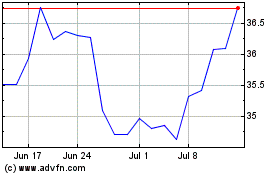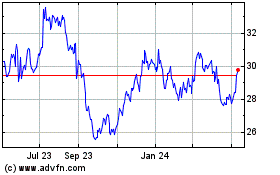Judge Rejects H-P Settlement of Shareholder Suit Over Aruba Merger -- Update
October 09 2015 - 5:16PM
Dow Jones News
By Liz Hoffman
A Delaware judge rejected the settlement of a shareholder
lawsuit against Hewlett-Packard Co., saying the welter of
litigation challenging corporate mergers has become a systemic
problem.
The lawsuit stemmed from H-P's $2.7 billion purchase of Aruba
Networks. It was brought on behalf of Aruba shareholders, but Vice
Chancellor J. Travis Laster said the proposed settlement offered
them little of value. The agreement called for H-P to disclose
additional information about the sale process and pay the
plaintiffs' lawyers a fee of $387,500.
Such so-called disclosure-only settlements, in which the only
money paid goes to lawyers who bring the suits, are now the norm in
the litigation that follows nearly every corporate merger.
Mr. Laster and others on the Delaware Court of Chancery, the
most influential venue for corporate disputes, have become
increasingly critical of these pacts.
"We've reached a point where we have to acknowledge that
settling for disclosures only has created a real, systemic
problem," Mr. Laster said. "We've all talked about it for a couple
years. When you get the sue-on-every-deal phenomenon, it is a
problem."
He said the formulaic arc that most M&A lawsuits take has
created a "misshapen legal regime" that doesn't benefit
investors.
Mr. Laster sharply criticized the plaintiffs' case in Aruba as
thin and said they didn't investigate deeply enough to determine
whether there were actual problems with the transaction. He
dismissed the case on the grounds that the lawyers didn't
adequately represent shareholders' interests.
Gregory Nespole of Wolf Haldenstein Adler Freeman & Herz
LLP, a lawyer for the plaintiffs, said his firm disagrees with the
ruling. "The firm prosecuted this case vigorously from start to
finish," Mr. Nespole said in an emailed statement. "Disclosure
settlements (some not nearly as robust as this) have been approved
many times in Delaware and elsewhere around the country."
H-P agreed to buy Aruba, a provider of network software, in
March for $24.67 a share, a 34% premium to the stock's closing
price the day before the deal was announced. Seven lawsuits were
ultimately filed, alleging the price was unfair and that process
wasn't robust enough. The parties reached a settlement in
April.
As is typical in such settlements, H-P agreed to release
additional details about the deal and pay a fee in exchange for
immunity from future lawsuits over the deal. Mr. Laster and others
have criticized such releases as "intergalactic," saying they are
too broad and can paper over real misconduct that might have been
unearthed with a more vigorous investigation.
The proposed disclosures showed H-P offered Aruba Chief
Executive Dominic Orr a new employment contract earlier than H-P
had said in regulatory filings, a fact Mr. Laster said could have
been grounds for a full-fledged lawsuit seeking damages.
Friday's decision doesn't affect a separate lawsuit brought by
Aruba shareholders seeking a higher price. That so-called appraisal
case, filed under a different set of legal rules, is pending and
covers 2.3 million shares, worth about $56 million at the buyout
price.
Most M&A-related lawsuits ultimately settle. Last year, 80%
of the settlements were for disclosures only, according to
Cornerstone Research. Critics of these cases say the fees paid
amount to a what one could call a merger tax, while proponents say
the cases act as incentives to directors to push for better deal
terms, knowing actions would be scrutinized.
Mr. Laster rejected a similar settlement in July stemming from
Cobham PLC's purchase of Aeroflex Holding Corp. The same week,
another judge in the same court withheld approval of a settlement
in litigation over Roche Holding AG's $8.3 billion acquisition of
InterMune. In September, a third judge approved a settlement
stemming from the private-equity buyout of Riverbed Technology Inc.
but put plaintiffs' lawyers and companies on notice that they
shouldn't expect him to do so in the future.
A tougher stance on settlements isn't necessarily a win for
companies. Though they often complain about such lawsuits,
companies benefit from easy, relatively inexpensive
settlements.
"The historical basis for this has been the defendants' desire
for complete peace," Mr. Laster said on Friday. "Just because you
want it doesn't mean you get it."
Write to Liz Hoffman at liz.hoffman@wsj.com
Subscribe to WSJ: http://online.wsj.com?mod=djnwires
(END) Dow Jones Newswires
October 09, 2015 17:01 ET (21:01 GMT)
Copyright (c) 2015 Dow Jones & Company, Inc.
HP (NYSE:HPQ)
Historical Stock Chart
From Mar 2024 to Apr 2024

HP (NYSE:HPQ)
Historical Stock Chart
From Apr 2023 to Apr 2024
